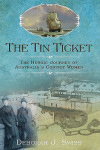The Tin Ticket
In the late eighteenth- through mid-nineteenth centuries, the British Empire exiled close to 162,000 men, women, and children under the Transportation Act to serve their prison sentences in Australia—simultaneously ridding Britain of an overcrowded prison population and providing the Empire with expendable colonists.
In the late eighteenth- through mid-nineteenth centuries, the British Empire exiled close to 162,000 men, women, and children under the Transportation Act to serve their prison sentences in Australia—simultaneously ridding Britain of an overcrowded prison population and providing the Empire with expendable colonists.
In The Tin Ticket: The Heroic Journey of Australia’s Convict Women, Deborah Swiss picks up a particularly poignant, and oft overlooked, aspect of this period. The Tin Ticket tells the stories of four early nineteenth-century women of London, arrested for petty theft and sentenced to serve their time in Van Diemen’s Land, modern Tasmania. Swiss uses these four stories to tell a complex narrative of Victorian socioeconomic tyranny against the gripping backdrop of Britain’s developing colonial efforts.
Writing about the history of any complex emergent historical identity is tricky—writing it well is even trickier. In The Tin Ticket, Swiss’s story picks up many types of interesting themes, many interesting histories if you will, and many ways of telling them. In her arcing narrative, Swiss shows the Victorian moral code—a Faustian social contract—that resulted in the social and gender inequality experienced by women from the back alleys of Glasgow to the prison of Newgate to the factories of Van Diemen’s Land. However, Swiss’s work tries to situate itself as not just a narrative of social injustice, but as part of an even broader history—one of Australia and Tasmania’s emerging national identity, with that identity strongly tied to its early women settlers.
The Tin Ticket takes its title from the small tin ticket each convict carried, stamped with a condemned prisoner’s unique identifying number. The narrative itself takes us to the early eighteenth century and examines the lives of four different women, all caught, in some way, through the cultural mores of Victorian England, condemned for their crimes, and exiled to Van Diemen’s Land to serve their sentences. These women (Agnes McMillan, Janet Houston, Bridget Mulligan, and Ludlow Tedder) survived the epic voyage from Newgate Prison to Van Diemen’s Land, with seemingly fated odds against them, and completed their sentences of factory labor.
Although The Tin Ticket focuses on these women, specifically, Swiss’s work strives to situate these women within their broader social contexts. She presents these relatively small narrative vignettes in the broader cultural context of the British Empire, particularly highlighting Elizabeth Gurney Fry’s work with prison reform and her demands for a more socially just system among the women within Newgate’s Prison.
Indeed, Elizabeth Gurney Fry becomes an interesting thread in the broader narrative of these women’s lives. Swiss shows the impact Fry’s gentle kindness had on Agnes McMillan and Janet Houston as they were held in Newgate, and the value that Fry’s quilting squares and charity sewing projects had for Ludlow Tedder during the sea voyage crossing from London to Van Diemen’s Land.
The Tin Ticket is a complicated piece of written history. It takes on complex social themes (like the economic tyranny of Victorian Britain) and tries to makes sense out of these contexts. Because The Tin Ticket tries to tell many kinds of history—biography, social history, gender history, etcetera—it begins to feel in parts a bit of the same uncertainty of direction as the women in the story. The reader is bounced from biography to a social history to a gender history to a nationalistic history, back to a biography, and so forth.
On one hand, these categories of history can certainly seem arcane at best and academic at worst. (What does it matter what “type” of history it is, just so long as the story gets told?) There can be a hesitancy on an historian’s part to intellectually commit to writing a history in a particular way. By picking one, it can feel like there is a part of the history that one is somehow “leaving out” if one chooses an overarching schema for one’s history.
On the other hand, Swiss’s reluctance to commit to one type of history leaves The Tin Ticket scattered and her, as a narrator, providing what feels to be historical moralizing, rather than insightful historical synthesis, to the reader. Rather than limiting one’s history, committing to a specific schema could help create a more clear narrative. And in this case, it could help the book keep from tripping over its own telling.
However, The Tin Ticket is a passionately written history and is certainly an interesting read. Moreover, and most importantly, it is clearly a history that Deborah Swiss doesn’t want to see relegated to some dusty back corner or some dungeon of an academic archive. She wants her audience to know, to experience, and to appreciate the realness of the stories and the history. The story she tells is one that stays with the reader—and it strikes me that at the end of the day, this is what the author really wants.





